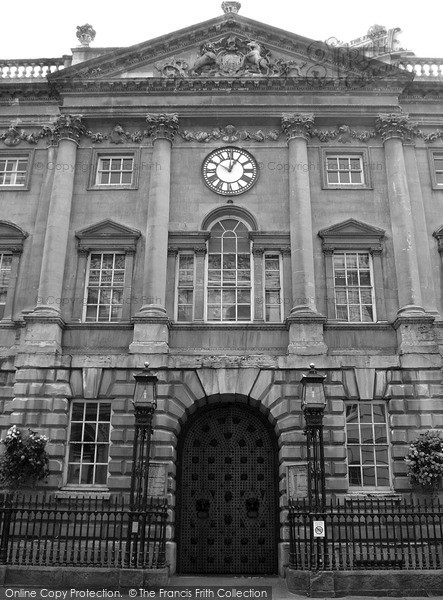Corn Exchange
A Memory of Bristol.
Before the railways (railroads) came, there was no particular reason why people in Bristol, England should keep the same time as people in London.
At that time there was no practical way of communicating information about time over a distance. When the telegraph made such communication possible, it became necessary for people living in one area to agree that they would not keep their own local time, but would all keep a time based on the local standard meridian.
Bristol is at 2 35' West of Greenwich, so when it is noon in Bristol is just past 10 past noon (twelve) in London.
There is still a relic of this change; the clock over the old Corn Exchange in Bristol has two minute hands. The black minute hand shows Greenwich Mean Time and the red minute hand shows Bristol time!
"Jeffrey Archer, Time Lord"
Still mounted on the wall above the Corn Exchange in Corn Street is unique evidence of what happens when man tries to mess about with time. It is a clock with three hands, one for the hour and two for the minutes, and it goes back to a time of chronological anarchy which Lord Archer's plan could revive in a small way.
Lord Archer of Weston-super-Mare was campaigning to get England and Scotland placed in different time zones before his little problem with the Law. It shows he didn't know his history and the chaos created by every provincial town keeping its own time, usually worked out by a local resident with some scientific knowledge.
Even when stagecoaches were introduced, it made little difference that Bristol and London were 10 minutes or so apart. But when the railways and the electric telegraph arrived, disaster loomed. All the new railways which ran to or from London decided to adopt Greenwich Mean Time (GMT) right across their systems. So, as Bristol and London time was 10 minutes different, the problems were obvious.
Passengers found themselves arriving in Bristol on (GMT) time, but too late for connections which had also left on time - Bristol time. Numerous complaints got nowhere and even in London itself there was a difference of two minutes between the east and west ends of the city. But the problem got worse the further you got from London.
When the line from Bristol to Exeter was extended to Plymouth, for instance, the railways had to overcome a time difference of 17 minutes. The answer, in Bristol and Bath at least, was imaginative, if not plain weird. The council simply added an extra minute hand to the Corn Exchange clock so it showed both Bristol and London time.
The clock itself dates back to 1819 and was made by Thwaites and Reede. It operates by a series of weights and pulleys and still has to be wound up every Saturday morning. The three hands idea was well meant, but as every other clock in Bristol showed local time only, the public remained totally confused. You can see why yourself by trying to read the right time today.
At least Bristol tried to tackle the problem unlike some other towns and cities the people of Exeter, for example, refused outright to accept GMT, which they called 'Cockney time'. However it wasn't the railways that led to the adoption of national time: it was the electric telegraph. By 1851, when a telegraph opened between London and Bristol, Britain was becoming too small for different time zones.
As historian John Latimer recorded ponderously: The rapid development of telegraphic business brought into increased prominence the troublesome question of local time still registered by the parish clocks, messages from London being received at Bristol about 10 minutes before ... they purported to be dispatched. In 1852, the City Corporation finally agreed to adopt Greenwich time, but it wasn't until 1880 that Parliament finally ordered the whole country to do so.
International time zones, based on Greenwich as a base line, followed four years later as did British summer time in 1916 as part of an effort to increase productivity during the war. That's still with us, despite many efforts to get rid of it. At some time, the extra minute hand on the Corn Exchange clock was removed and forgotten until 1983 when the clock was being restored, and the stub of the extra hand was rediscovered.
Bristol clock engineer Andy Nicholls made a new hand to match the original and the refurbished clock was reinstalled in 1989. Once again, this unique piece of Bristoliana is baffling people who just want to know the time. Under Lord Archer's plan, England would be on European mainland time while Scotland would keep current hours.
This would give England an extra hour's daylight in the evenings, and, says Lord Archer, cut crime and accidents. Tell that to the Victorian train traveller!
Add your comment
You must be signed-in to your Frith account to post a comment.
Add to Album
You must be signed in to save to an album
Sign inSparked a Memory for you?
If this has sparked a memory, why not share it here?


Comments & Feedback
Be the first to comment on this Memory! Starting a conversation is a great way to share, and get involved! Why not give some feedback on this Memory, add your own recollections, or ask questions below.